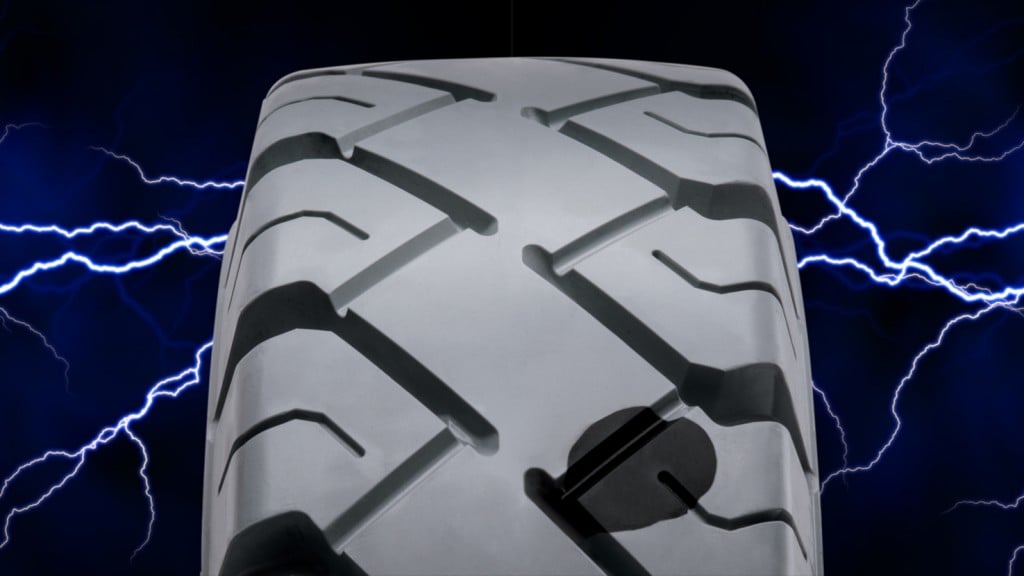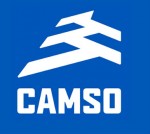Camso expands non-marking anti-static forklift tire line-up
New patented resilient tire provides increased safety and lower fire potential

Camso, based out of Magog, Quebec, has introduced the Solideal RES Xtreme NMAS, a new non-marking resilient forklift tire, which resolves the important safety issues linked to static electricity generated in non-marking tires in a range of applications, including recycling and waste management.
The announcement comes about a year after the launch of the industry's first non-marking anti-static (NMAS) forklift tire, the Solideal PON 775 NMAS by Camso. The addition of the Solideal RES Xtreme NMAS to Camso's portfolio makes it the first tire manufacturer to offer a complete range of solid non-marking anti-static (NMAS) forklift tires, now supplying both press-on and resilient solutions.
"The Solideal PON 775 NMAS received an unprecedented welcome in the market. Customers were finally getting an extreme performance non-marking tire that also prevents static electricity build-up," says Thierry Miche, Product Line Executive Director - Material Handling, at Camso. "While press-on tires are found predominantly in North America, forklifts in Europe, Oceania and Latin America mostly run on resilient tires. As the global leader in the industry, we had to develop a resilient NMAS tire to answer customers' needs around the world."
The ultimate resilient tire for high intensity applications
In addition to resolving the important safety issue of static electricity generated by non-marking tires, the Solideal RES Xtreme NMAS reduces vibration, which increases operator comfort and lowers heat build-up for enhanced tire life. Its design borrows key features from the popular Solideal RES 660 Xtreme Series and benefits from Camso's proven anti-static technology.
The problem with non-marking tires
"For several years, the adverse problem of static build-up has been part of the material handling industry. Since the use of non-marking tires is a requirement for up to 30% of forklift applications, their tendency to create static was just part of the price you had to pay for their benefits," adds Miche.
Indeed, the accumulation of static electricity is prevalent in non-marking tires because of the silica used as the reinforcing filler. It gives the tires their light color, but rather than conducting electricity like its carbon black counterpart, silica has isolating properties. As a result, static generated from friction is stored rather than dissipated and continues to build up in the machine until there is contact with another conductive material to release the charge - like the human body or any other equipment in the facility.
"Static build-up in non-marking tires can lead to potential operator injuries, fires and facility damages, safety issues Camso is very serious about," concludes Miche
A revolutionary patented technology
While grounding straps and chains provide some protection, they wear down, break, or collect dust and debris, which gradually insulates them from the ground. It can also be a costly part of preventive maintenance.
Since 2018, Camso has been supplying its patented non-marking anti-static technology to material handling fleets seeking a safer and more effective alternative for non-marking tires. Solideal RES Xtreme NMAS is cured with a cylindrical piece of highly conductive black rubber connected all the way from the steel wheel to the tread face, which acts as a path to dissipate accumulated electricity on every rotation. This anti-static plug is easily noticeable when looking at the tire: there is a black dot on the face of the tread.
With the Solideal RES Xtreme NMAS, Camso now offers a complete, solid tire line-up to overcome the challenges of all high intensity applications where static build-up can cause safety hazards. The Solideal RES Xtreme NMAS is currently available through Camso's global distribution network.



